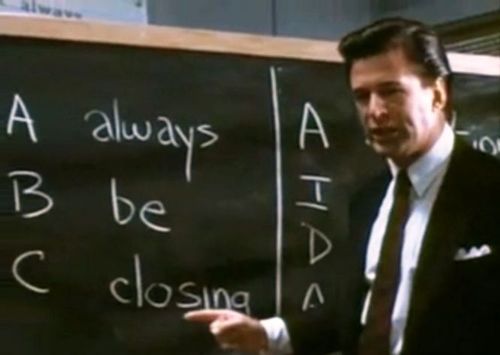A recent post at The Ruthless Monk instructively epitomizes the evangelism-as-sales method. It even uses that word, “method.”
The post, by Leslie Keeney, is called “Why ‘Just Telling Your Story’ Is NOT the Best Way to Share the Gospel.”
I think it shows where you’ll wind up if you imagine that “sharing the gospel” is all about ABC — Always Be Closing. For Keeney, closers don’t tell their stories, closers argue to win:
Anyone who’s ever taken a class on how to share their faith has heard some well-intentioned teacher say, “You don’t need to learn a lot of big words. Just tell them your story. Just tell them how Jesus changed your life. No one can argue with that.”
And everyone sighs a big sigh of relief because they thought they’d have to spend time learning how to answer hard questions. Questions like “how do you know Jesus rose from the dead?” Or “how do you know the Bible’s inspired?”
I understand why this method of what we used to call “witnessing” is popular. Well-meaning pastors realize that people are scared to tell people about Jesus, and they want to find an easy method that they can use to teach their congregation how to share their faith without actually having to ask them to do anything — at least anything hard.
The problem with this method is that it doesn’t work — at all.
Like most Christians who seek a “method” that “works,” Keeney never explains what she means by “doesn’t work.” It seems that what she means is, as the popular evangelism manual put it, “Getting to Yes.” She means closing the sale.
And to close the sale, Keeney says, you’re going to need to learn to hurl “apologetic” talking points at your targets in a Gish Gallop of intellectual-sounding gobbledygook. You can be sure this will persuade any wavering doubters because, after all, this is the same mantra of “apologetic” slogans you endlessly recite to yourself in a desperate attempt to reassure yourself that it’s all true. And it works for you, right?
 “While telling our story will often be the first thing we do when we begin sharing the gospel,” Keeney writes, “it has to be backed up with good apologetics.”
“While telling our story will often be the first thing we do when we begin sharing the gospel,” Keeney writes, “it has to be backed up with good apologetics.”
One gets the sense that “telling our story” doesn’t impress Keeney because she’s not in the habit of really listening to anyone else’s story. Why should she? Why should a Christian, who has absolute truth, listen to someone else who has only lies?
If that seems like an uncharitable reading of Keeney’s argument, well, it’s still far more charitable than her own dismissive disregard for the stories (and arguments) of non-Christians. “If I am talking to a Buddhist who claims to have experienced Nirvana …” she writes, which hints that while she may have “talked to” a Buddhist, she’s never listened to one.
Keeney’s “method” that “works” seems eerily similar to what I described last year as an approach to evangelism that “starts with a sales pitch and ends in an argument.”
And, like all such sales-based “apologetics,” it’s not really about the other person at all. It’s about using another person as a convenient foil in an exercise intended to reinforce for ourselves what we already believe.
Evangelism is hospitality. And hospitality is always focused on the guest. That means “telling our story,” but even more than that, it means listening to the stories of others.
Here’s a snippet from my June 2011 post on evangelism that gets at what bugs me about Keeney’s sales pitch for sales pitches:
Like improv, evangelism is usually more about listening than it is about talking.
The Cherokee Baptist theologian Bill Baldridge tells a story about white missionaries who arrived at the Indian settlement. “We are here to tell you the story of our God and of salvation,” they announced.
The elders welcomed them, brought them food, and gathered around to hear this story. The missionaries, pleased by this enthusiastic audience, decided to go with the Long Version. They started at the beginning and over the next several hours they told the whole great Christian saga of creation, fall and redemption.
When at last the missionaries were finished, the elders thanked them. “This is a good story,” the elders said. “Now we would like to share with you our story.”
The missionaries were furious. Hadn’t these people been listening? Didn’t they realize that they had just heard the One True Story and that their old story, whatever it was, no longer mattered?
The missionaries abruptly left, shaking the dust off their shoes and heading out to find some other group more receptive to to their message.












